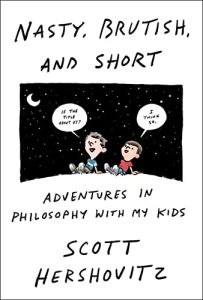A Facebook friend who also happens to be a librarian recently posted “If you want to have a cursory understanding of a complex topic…get a children’s book about it.” Brilliant counsel! And while that’s not exactly what I did, it was in the back of my mind when I stumbled on Nasty, Brutish, and Short: Adventures in Philosophy with My Kids, by Scott Hershovitz.
Nasty, Brutish, and Short isn’t a children’s book, but it is a book by a philosopher recounting conversations he’s had with his young sons, Rex and Hank, about philosophy. I figured if he could make philosophy accessible to them, maybe he could do the same for me. That, it turns out, was his plan all along. As he writes in the introduction, “[t]his book is inspired by kids, but it’s not for them. In fact, kids are my Trojan horse. I’m not after young minds. I’m after yours.”
In twelve chapters, each devoted to a topic ripe for discussion (rights, punishment, authority, knowledge, truth, etc.), Hershovitz shares stories of children (his own and others’) initiating and participating in philosophical inquiry with greater facility than most adults. In fact, as he goes on to show, they often wind up pondering the exact same questions as renowned philosophers of yore! (Examples include the shifted color spectrum, credited to John Locke, Aquinas’ first cause argument, and Descartes’ Cogito: “I think, therefore I am.”)
Chapter Four of Nasty, Brutish, and Short, titled “Authority,” is a good example of how Hershovitz approaches his subject. He begins with a kid-related anecdote—his son Rex refusing to comply with his father’s request that he put on his shoes. Kids’ chafing at parental authority is nothing new. What kid hasn’t uttered the phrase “You aren’t the boss of me!” to a frazzled parent seeking compliance? And what parent hasn’t responded “Because I said so” when asked “Why” by a stubborn child?
For Hershovitz, however, such encounters are great jumping off points for discussions about power vs. authority, the nature of obligation, and the role reasoning and responsibility should play in compliance. He writes about these concepts as they play out in contemporary life–between bosses and employees, parents and children, teachers and students, the government and the governed. (Gordon Ramsay in Kitchen Nightmares even makes a cameo.) He shares various philosophers’ takes on authority, as well as highlights from his many conversations with Rex and Hank about the subject.
By the end of each chapter you realize not only that Hershovitz has gotten you to “do philosophy” with him, but also that philosophy—thinking carefully about important things–is something worth practicing ourselves and encouraging in our children. (Don’t worry—Hershovitz is well aware that there is a time and a place, especially with kids!)
In his conclusion, titled “How to Raise a Philosopher,” Hershovitz reminds us of what he thinks the goal should be:
The aim is not to raise a professional philosopher. It’s to raise a person who thinks clearly and carefully. It’s to raise a person who thinks for themself. It’s to raise a person who cares what others think—and thinks with them. In short, the aim is to raise a person who thinks.
Definitely a worthy goal! And an inspiring read!
Hershovitz, Scott. Nasty, Brutish, and Short: Adventures in Philosophy with My Kids. New York: Penguin, 2022.


